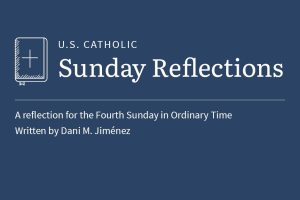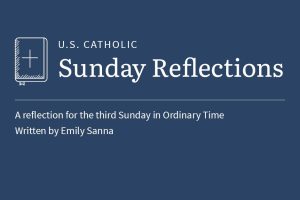Readings (Year B):
Ezekial 2:2–5
Psalm 123:1–4
2 Corinthians 12:7–10
Mark 6:1–6
Reflection: Our common project
It must be the Holy Spirit that saw to it the gospel passage for this Sunday falls on the Fourth of July. Jesus teaches in the synagogue and his content causes offense among the people of his ‘native place,’ the one place where he says a prophet is without honor. The Fourth of July is a time where it can be difficult to speak prophetically about my ‘native place’—the United States. And yet love, and the Spirit, calls us to do so.
July 4th commemorates the signing of the Declaration of Independence. We know many of the most famous statements that Thomas Jefferson made in that document: “We hold these truths to be self-evident, that all men are created equal, that they are endowed by their Creator with certain unalienable Rights, that among these are Life, Liberty, and the pursuit of Happiness.” That statement represents the core idea of what we call the American dream, the promise that our nation holds, or should hold: the task that it has to live up to. It is a promise that is unfulfilled. This promise was unfulfilled by the founders. Jefferson—the Apostle of American liberty who wrote so eloquently of freedom—was a slave-owner. For much of our history, Catholics were subject to discrimination on the basis of their religion, a situation that many of our Muslim brothers and sisters face in contemporary times. We only need to scan the headlines each day to find contemporary instances of injustice and discrimination that happen to our fellow Americans on the basis of their religion, race, gender or identity.
So Why July 4? What do we celebrate on this day? We celebrate the promise, the potential, the capacity for growth, development, and change that is within our power to bring to fulfillment. Our national project of freedom is work left undone. It was put in place by flawed people and it continues to be carried out by flawed people. But we have trust in the hope of that promise. The same is true of our faith, and our church. Time and again we could look to see how leadership has failed us, how corruption infects us, how despair threatens to overtake us, but we learn from the past and we proceed to a future of our own making, guided by Christ. We have hope that the promises of our faith will come to fulfillment. We are not there, far from it. But we work toward that goal.
Jesus in the gospel was amazed by the lack of faith among his countrymen. But we know that part of his mission was to bring that faith to the world. This is our common project. We celebrate the fact that it is not completed, that it will continue to grow so long as we the people have the will to make our voices and actions heard and that we can, should, and will get to work to make things better for all Americans.














Add comment